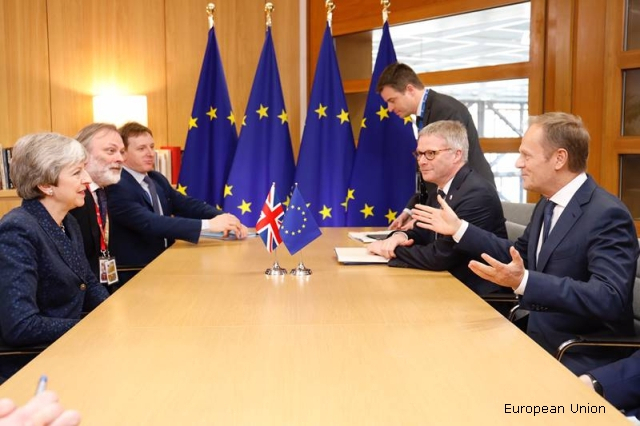Brexit delayed
The EU leaders who met in Brussles this week accepted a delay in the UKs scheduled withdrawal from the community bloc

Roxana Vasile, 22.03.2019, 13:41
The UK leaving
the EU was scheduled for March 29, but British Prime Minister Theresa May has
called for postponement for June 30. After nearly seven hours of talks, the
heads of state and government from EU member states decided to give the UK not
one, but two deadlines for Brexit, neither of which is slated for the end of
June.
According to the
first scenario, if the withdrawal agreement negotiated with the EU is approved
next week, despite being rejected twice already, the European Council has
agreed to postponing Brexit for May 22.
In the second
scenario, if the agreement falls through, the Council proposes a postponement
for April 12, by which date Great Britain must make a decision. In other words,
all options are on the table by April 12: the British Government can organize
elections for the European Parliament and then ask for a new delay of Brexit,
Britain can withdraw without an agreement or option number three, it can move
to revoke Article 50 and cancel Brexit altogether. From Romania’s perspective,
a no-deal Brexit is a lose-lose scenario.
President Klaus Iohannis: The agreement is good, we all contributed to
its elaboration, it was negotiated by our team and it’s the best possible
version. A so-called ‘hard Brexit’ poses many problems, first to Great Britain
and then to us, because we want to build for the future and it’s best we start
on the right foot.
In the event
Parliament rejects the agreement a third time, Brussels has contingency
measures set in place to protect its citizens and the interests of the EU, says
European Commission President Jean-Claude Juncker.
A number of 19
legislative proposals have been adopted aimed at dealing with the effects of a
no-deal Brexit, concerning citizens’ rights, air and road transport and fishing
sector.
As regards Prime
Minister Theresa May, she claims delaying Brexit is an opportunity for the
British Parliament to finally accept the withdrawal agreement and thus put an
end to uncertainty once and for all. A source of political turmoil at home,
Brexit has also had a powerful emotional impact on the British population.
Four in ten
British adults said they have been left angry, powerless or worried by Brexit
in the past year, according to a recent poll. Only 9% of respondents said
Brexit made them feel hopeful. As for European citizens, they never cease to
wonder if the effort is worth the hassle.






























